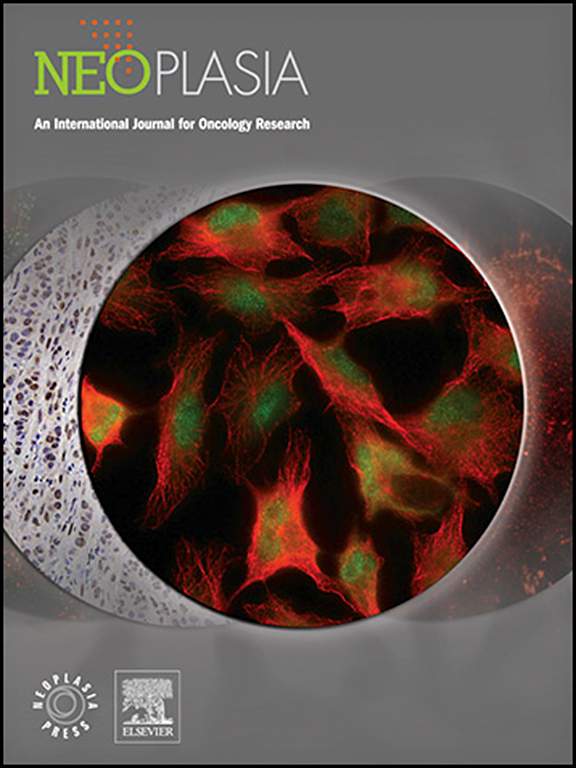Comprehensive mapping elucidates high risk genotypes in primary metastatic breast cancer
IF 7.7
2区 医学
Q1 Biochemistry, Genetics and Molecular Biology
引用次数: 0
Abstract
Among women with primary metastatic breast cancer (pMBC), around 5 % of women with primary invasive breast cancer, high-risk mutations associated with disease progression and poor prognosis is shown. The heterogeneity and clinical implications of these genomic alterations remains to be fully elucidated. We performed comprehensive gene mapping on 211 tumors of women diagnosed with pMBC at Rigshospitalet 2014-2021. After DNA purification 203 tumor samples were eligible for analysis. Median age in our cohort was 69 years, 68 % were ER-positive/HER2-negative, 23 % HER2-positive and 9 % triple-negative. A high tumor mutational burden (TMB), shown in 10 %, was in univariable analysis associated with a poor prognosis and a median overall survival of 5.3 months (95 % CI, 2.5-51.3) but no significant association after adjusting for subtype and age. 65 % of tumors had an actionable biomarker, including a PIK3CA mutation in 39 %. TP53 mutations were found in 33 % of tumors and were associated with an increased risk of death (adjusted HR: 1.60, 95 % CI; 1.07-2.40). We have found that for women with pMBC, the disease is driven by several targetable genetic mutations across subtypes, however our results suggest a reduced prognostic value of TMB for this complex patient group. Taken together, our findings substantiate the value of early genomic profiling to actively identify women that may be eligible for a more individualized treatment scheme.
综合定位阐明了原发性转移性乳腺癌的高危基因型
在原发性转移性乳腺癌(pMBC)妇女中,约5%的原发性浸润性乳腺癌妇女,显示出与疾病进展和不良预后相关的高风险突变。这些基因组改变的异质性和临床意义仍有待充分阐明。我们在Rigshospitalet 2014-2021年对211例诊断为pMBC的女性肿瘤进行了全面的基因定位。DNA纯化后,203份肿瘤样本符合分析条件。我们的队列中位年龄为69岁,68%为er阳性/ her2阴性,23%为her2阳性,9%为三阴性。在单变量分析中,10%的高肿瘤突变负担(TMB)与预后差和中位总生存期为5.3个月(95% CI, 2.5-51.3)相关,但在调整亚型和年龄后无显著相关性。65%的肿瘤具有可操作的生物标志物,包括39%的PIK3CA突变。在33%的肿瘤中发现了TP53突变,并与死亡风险增加相关(校正HR: 1.60, 95% CI;1.07 - -2.40)。我们发现,对于患有pMBC的女性,该疾病是由跨亚型的几种可靶向基因突变驱动的,然而我们的结果表明,TMB对这一复杂患者群体的预后价值降低。综上所述,我们的研究结果证实了早期基因组分析在积极识别可能有资格接受更个性化治疗方案的女性方面的价值。
本文章由计算机程序翻译,如有差异,请以英文原文为准。
求助全文
约1分钟内获得全文
求助全文
来源期刊

Neoplasia
医学-肿瘤学
CiteScore
9.20
自引率
2.10%
发文量
82
审稿时长
26 days
期刊介绍:
Neoplasia publishes the results of novel investigations in all areas of oncology research. The title Neoplasia was chosen to convey the journal’s breadth, which encompasses the traditional disciplines of cancer research as well as emerging fields and interdisciplinary investigations. Neoplasia is interested in studies describing new molecular and genetic findings relating to the neoplastic phenotype and in laboratory and clinical studies demonstrating creative applications of advances in the basic sciences to risk assessment, prognostic indications, detection, diagnosis, and treatment. In addition to regular Research Reports, Neoplasia also publishes Reviews and Meeting Reports. Neoplasia is committed to ensuring a thorough, fair, and rapid review and publication schedule to further its mission of serving both the scientific and clinical communities by disseminating important data and ideas in cancer research.
 求助内容:
求助内容: 应助结果提醒方式:
应助结果提醒方式:


